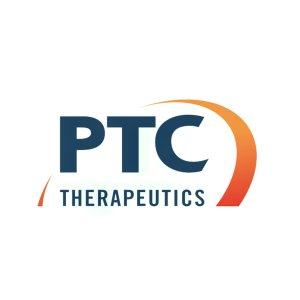Positive Data from FIREFISH Study of Evrysdi™ (risdiplam) in Infants with Type 1 Spinal Muscular Atrophy Published in The New England Journal of Medicine
Rhea-AI Summary
PTC Therapeutics announced positive results from the pivotal FIREFISH study published in The New England Journal of Medicine, evaluating Evrysdi™ (risdiplam) for infants with symptomatic type 1 spinal muscular atrophy (SMA). The study showed significant improvements in survival and developmental milestones after 12 months, with 90% of infants alive without permanent ventilation. Despite some serious adverse events, the overall safety profile remains favorable. This study reinforces the therapeutic potential of Evrysdi in treating SMA, providing insight into its role in addressing unmet medical needs.
Positive
- 90% of infants were alive without permanent ventilation after 12 months.
- Significant developmental improvements were reported: 41% could sit unsupported, 53% achieved head control.
- Evrysdi showed a median 1.9-fold increase in survival motor neuron (SMN) protein after 12 months.
Negative
- Three infants experienced fatal complications, though not attributed to Evrysdi.
- Common adverse events included fever (52%) and pneumonia (19%).
News Market Reaction
On the day this news was published, PTCT declined 4.23%, reflecting a moderate negative market reaction.
Data tracked by StockTitan Argus on the day of publication.
SOUTH PLAINFIELD, N.J., Feb. 24, 2021 /PRNewswire/ -- PTC Therapeutics, Inc. (NASDAQ: PTCT), today announced the publication of results from the dose finding Part 1 of the pivotal FIREFISH study evaluating Evrysdi™ (risdiplam) in infants with symptomatic type 1 spinal muscular atrophy (SMA) in The New England Journal of Medicine (NEJM). The Part 1 data showed that patients treated with Evrysdi at 12 months demonstrated significant improvement in survival and developmental milestones, including the ability to survive without permanent ventilation, and the ability to sit without support for at least five seconds. Data from the study also demonstrated increased levels of survival motor neuron (SMN) protein, which is critical for maintaining nerve and muscle function.
"The positive data published in The New England Journal of Medicine reinforces the benefits of Evrysdi and substantiates over a decade of work building our splicing platform to develop treatments for patients with diseases of high unmet medical need, like SMA," said Stuart W. Peltz, Ph.D., Chief Executive Officer, PTC Therapeutics. "We believe the platform has broad potential for a large number of target genes across many disease areas."
The table below depicts improvements across Part 1 FIREFISH study after 12 months of treatment*:
Motor milestone achievement | · 7 infants ( · 9 infants ( · 1 infant ( · 11 infants ( |
Pulmonary function and | · · |
Survival | · · Three infants experienced fatal complications of their disease at one, eight and 13 months |
BSID- III - Gross Motor Scale of the Bayley Scale of Infant and Toddler Development – Third Edition |
HINE-2 - Hammersmith Infant Neurological Examination Module 2 |
CHOP-INTEND - Children's Hospital of Philadelphia Infant Test of Neuromuscular Disorders |
*Total n=21: low-dose cohort, n=4, and high-dose cohort, n=17. |
Among the 21 infants enrolled in Part 1 of the FIREFISH study, the most common adverse events included fever (pyrexia; |
Pharmacodynamic data show infants receiving the recommended dose of Evrysdi had a median 1.9-fold increase from baseline of SMN protein at 12 months of treatment, with blood SMN protein concentration reaching its highest median value of 5.87 ng/ml (n=17; range 2.84 to 8.76) at four weeks, and at 12 months the median value was 5.66 ng/ml (n=15; range 2.66 to 8.60).
FIREFISH is an open-label, two-part, pivotal clinical trial designed to evaluate the safety, tolerability, efficacy, pharmacokinetics (PK) and pharmacodynamics (PD) in infants with type 1 SMA. Part 1 was a dose-escalation study with the primary objective of assessing the safety profile of risdiplam in infants and determining the dose for Part 2. The median duration of treatment was 14.8 months at the time of analysis. The median age at enrollment was 6.7 months and symptom onset between the ages of 28 days to 3 months.
Evrysdi is designed to treat SMA by increasing and sustaining the production of the SMN protein. SMN protein is found throughout the body and is critical for maintaining healthy motor neurons and movement. Roche leads the clinical development of Evrysdi as part of a collaboration with the SMA Foundation and PTC Therapeutics. Evrysdi is marketed in the United States by Genentech, a member of the Roche Group.
About Evrysdi™ (risdiplam)
Evrysdi™ is a survival motor neuron 2 (SMN2)-directed RNA splicing modifier designed to treat SMA caused by mutations in chromosome 5q that lead to SMN protein deficiency. Evrysdi is designed to distribute evenly to all parts of the body, including throughout the central nervous system (CNS). Evrysdi is administered daily at home in liquid form by mouth or feeding tube. In August 2020, the U.S. Food and Drug Administration approved Evrysdi for the treatment of spinal muscular atrophy for adults and children 2 months and older. Evrysdi is marketed in the United States by Genentech, a member of the Roche Group. Evrysdi is also approved in seven countries and has been filed in more than 50 countries worldwide.
Clinical Trial Safety Data
The safety profile of Evrysdi was established across FIREFISH and SUNFISH pivotal trials. The most common adverse reactions in later-onset SMA (incidence of at least 10 percent of patients treated with Evrysdi™ and more frequently than control) were fever, diarrhea, and rash. The most common adverse reactions in infantile-onset SMA were similar to those observed in later-onset SMA patients. Additionally, the most common adverse reactions (incidence of at least 10 percent) were upper respiratory tract infection, pneumonia, constipation, and vomiting.
About the Risdiplam Clinical Studies
FIREFISH (NCT02913482) - An open-label, two-part pivotal clinical trial in infants with type 1 SMA. Part 1 was a dose-escalation study in 21 infants with the primary objective of assessing the safety profile of risdiplam in infants and determining the dose for Part 2. Part 2 is a pivotal, single-arm study of risdiplam in 41 infants with type 1 SMA treated for two years followed by an open-label extension. Enrollment for Part 2 was completed in November 2018. The primary objective of Part 2 was to assess efficacy as measured by the proportion of infants sitting without support after 12 months of treatment, as assessed in the Gross Motor Scale of the Bayley Scales of Infant and Toddler Development - Third Edition (BSID-III) (defined as sitting without support for five seconds). The study met its primary endpoint.
SUNFISH (NCT02908685) - A two part, double-blind, placebo controlled pivotal study in people aged 2 to 25 years with types 2 or 3 SMA. Part 1 (n=51) determined the dose for the confirmatory Part 2. Part 2 (n=180) evaluated motor function using total score of Motor Function Measure 32 (MFM-32) at 12 months. MFM-32 is a validated scale used to evaluate fine and gross motor function in people with neurological disorders, including SMA. The study met its primary endpoint.
In addition to FIREFISH and SUNFISH, Evrysdi™ is being evaluated in a broad range of people with SMA, including in:
JEWELFISH (NCT03032172) - An open-label exploratory trial designed to assess the safety, tolerability, pharmacokinetics (PK) and pharmacodynamics (PD) in people with SMA aged 6 months to 60 years who received other investigational or approved SMA therapies for at least 90 days prior to receiving Evrysdi™. The study has completed recruitment (n=174).
RAINBOWFISH (NCT03779334) - An open-label, single-arm, multi-center study, investigating the efficacy, safety, pharmacokinetics, and pharmacodynamics of risdiplam in babies (~n=25), from birth to 6 weeks of age (at first dose), with genetically diagnosed SMA, who are not yet presenting with symptoms. The study is currently recruiting.
About Spinal Muscular Atrophy (SMA)
Spinal muscular atrophy (SMA) is a severe, progressive neuromuscular disease that can be fatal. It affects approximately one in 10,000 babies and left untreated is the leading genetic cause of infant mortality. SMA is caused by a mutation of the survival motor neuron 1 (SMN1) gene, which leads to a deficiency of SMN protein. This protein is found throughout the body and is essential to the function of nerves that control muscles and movement. Without it, nerve cells cannot function correctly, leading to muscle weakness over time. Depending on the type of SMA, an individual's physical strength and their ability to walk, eat or breathe can be significantly diminished or lost.
About PTC Therapeutics, Inc.
PTC is a science-driven, global biopharmaceutical company focused on the discovery, development and commercialization of clinically differentiated medicines that provide benefits to patients with rare disorders. PTC's ability to globally commercialize products is the foundation that drives investment in a robust and diversified pipeline of transformative medicines and our mission to provide access to best-in-class treatments for patients who have an unmet medical need.
For More Information:
Investors & Media:
Jane Baj
+1 (908) 912-9167
jbaj@ptcbio.com
Forward-Looking Statements:
This press release contains forward-looking statements within the meaning of The Private Securities Litigation Reform Act of 1995. All statements contained in this release, other than statements of historic fact, are forward-looking statements, including statements regarding: the future expectations, plans and prospects for PTC; advancement of PTC's joint collaboration program in SMA, including any potential regulatory submissions, commercialization or royalty or milestone payments; PTC's strategy, future operations, future financial position, future revenues, projected costs; and the objectives of management. Other forward-looking statements may be identified by the words "guidance", "plan," "anticipate," "believe," "estimate," "expect," "intend," "may," "target," "potential," "will," "would," "could," "should," "continue," and similar expressions.
PTC's actual results, performance or achievements could differ materially from those expressed or implied by forward-looking statements it makes as a result of a variety of risks and uncertainties, including those related to: the outcome of pricing, coverage and reimbursement negotiations with third party payors for PTC's products or product candidates that PTC commercializes or may commercialize in the future; the enrollment, conduct, and results of ongoing studies under the SMA collaboration and events during, or as a result of, the studies that could delay or prevent further development under the program, including any potential regulatory submissions and potential commercialization with respect to Evrysdi; significant business effects, including the effects of industry, market, economic, political or regulatory conditions; changes in tax and other laws, regulations, rates and policies; the eligible patient base and commercial potential of PTC's products and product candidates; PTC's scientific approach and general development progress; and the factors discussed in the "Risk Factors" section of PTC's most recent Quarterly Report on Form 10-Q and Annual Report on Form 10-K, as well as any updates to these risk factors filed from time to time in PTC's other filings with the SEC. You are urged to carefully consider all such factors.
As with any pharmaceutical under development, there are significant risks in the development, regulatory approval and commercialization of new products. There are no guarantees that any product will receive or maintain regulatory approval in any territory, or prove to be commercially successful, including Evrysdi.
The forward-looking statements contained herein represent PTC's views only as of the date of this press release and PTC does not undertake or plan to update or revise any such forward-looking statements to reflect actual results or changes in plans, prospects, assumptions, estimates or projections, or other circumstances occurring after the date of this press release except as required by law.
SOURCE PTC Therapeutics, Inc.







